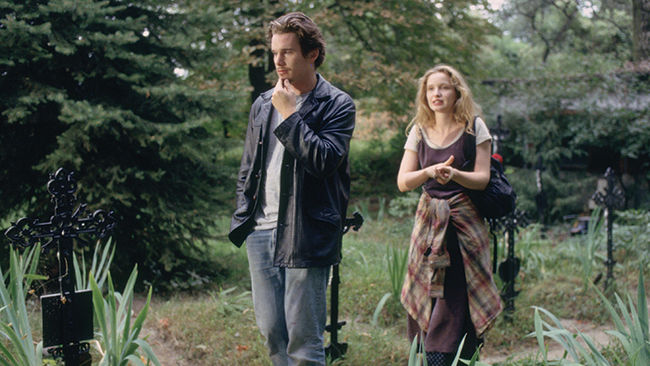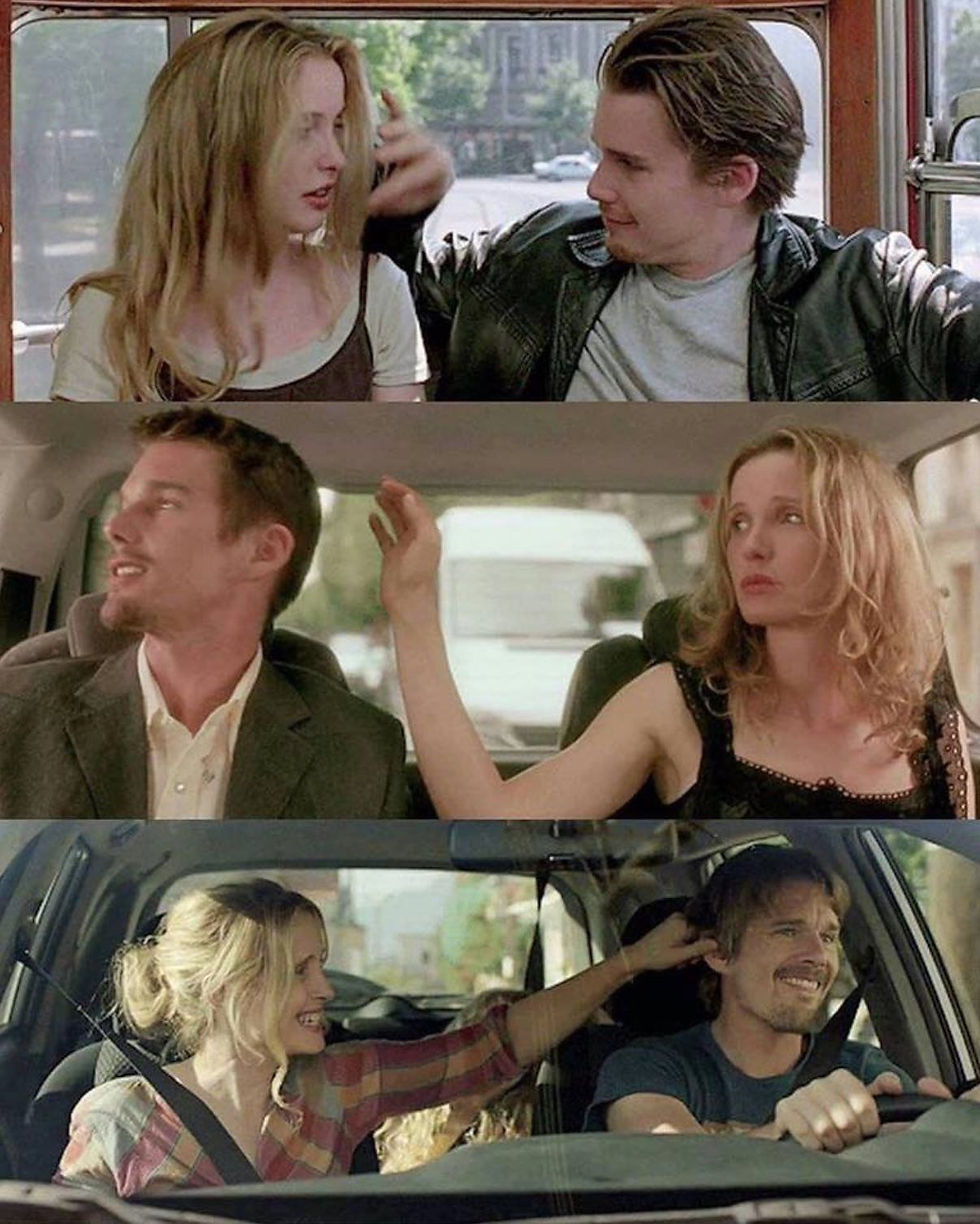Do I look any different? : The Importance of Time in The Before Trilogy.
- Fiona Craughwell
- Jan 9, 2022
- 5 min read
The New Year seems like a perfect or terrible opportunity to talk about time. It is not just the New Year that's got me thinking about time but Richard Linklater and his Before trilogy also. Starting in one of the best years of all time doesn't 1995 and finishing in 2013 that's, his trilogy spanned 13 years with nine years separating each film. Course one also thinks of one of his latest films, Boyhood, which is almost as long as his entire trilogy, 12 years; time is the undercurrent of Boyhoods entire plot. Before I return to Linklater and his films, I think I need to derail just for a mo to talk about time.
Many film buffs and indeed most people, in general, have heard of Freud and his wonderful world of psychoanalysis in one way or another. So many theories founded by Freud and Lacan are used when trying to decipher meaning in film. Course, this comes with its controversies. Should film need a definition? How do you know which meaning's the "correct one? Etc. Theorists such as Deleuze critiqued theories founded by Fred and his cohorts as he felt much of psychoanalysis comes with preconceived notions; it tries to fit its ideas around everything.
Deleuze is concerned with time. He sees us as always changing, constantly evolving because the notion of what it is to be, man, women, human, member of society is continuously evolving. What brings the changes? Well, time, time passes, and life becomes different.
Change brings newness. Deleuze was interested in how we and our brains respond to originality. As people, we can become accustomed to things we get used to, looking at the same things. If we take the same route to work every day, do we notice the scenery anymore? Probably not, but a film can allow for new encounters and perspectives. It can be an escape from the mundane, from our world, from our time.

Deleuze feels film has presence; we experience sight and sound as they happen; his idea of time differs from Lacan or Freud. To Deleuze, Freud and Lacan are concerned with looking for what is lost, but to Deleuze, time is change and change is what's real, its reality. In Hollywood, time is only experienced through movement relevant to the plot. When we watch a romantic tale, time is only shown appropriately to the romantic story. Two characters fall in love; they separate, perhaps for months and are reunited. We don't see the actual time spent apart, don't see them doing the dishes. The only time we see is what moves their story along. Genre is full of these cliché storylines where time is only relevant to the plot you've visited one romantic film you have seen them all, we get used to, isn'tt isn't new or exciting anymore, and we disengage.
Deleuze felt a change post WW2. The world was no longer the same, and so new stories were needed for this new world. Perhaps there will be a similar movement in a post covid world (if there ever is one) though I am not sure art responds the same way it used to.
This post-war movement shows time and, in fact, the world in a new and, therefore, a much more accurate way. Characters struggle to understand who they are and the world they now live in. Time drags and stalls. A car journey or plane ride doesn't just happen instantly anymore; this slowness allows us to look, spend more time observing and in doing so, maybe find something new. One of the key features Deleuze identified in these films was that they often feature emotionally charged moments in relationships. He identified these crisis narratives, crisis of self, and action: no cause-effect, logic, and answers.

So I'm sure you are wondering why I have decided to bombard you with this; I promise there is a good reason. I was sick recently and decided to spend the time rewatching Linklater's Before trilogy, one of my favourites and his most refined. As I was watching these films, something struck me: the importance of time. Not just Deleuze's theories of time, not just 'time in the film' but allowing for time.
I believe much of Linklater's work fits into Deleuze's theories and is more like a post-war film than a modern one. I don't know if this is intentional, but it certainly achieves the goals that Deleuze feels are essential.
The Before trilogy is a film that is 100 per cent about emotionally charged relationships. The narrative of all three films is based solely on Celine and Jesse's relationship to each other. The first two films indeed leave us with unanswered questions, contra to the classical Hollywood narrative, there is little reasoning and almost no answers for character or viewer. We don't know what will become of our loved up couple, and Linklater makes us wait on tenterhooks for nine whole years, and even then, the sequel bides its times and plays with us before answering any of our pressing questions.
One of the reasons I don't enjoy the finale, Before Midnight, as much is because of its lack of ambiguity. The film should have ended when Celine storms out of the hotel room and doesn't return immediately, leaving Jesse to wonder if she is coming back at all. Maybe as it was the finale, Linklater wanted to round up their story, but to me, it caved and gave us an ending that we have already seen before.
Regardless,s I think the Before Trilogyfits nearly perfectly into Deleuze's observations and is more like a post-war tale than something from the 90s. Celine and Jesse wander about different European destinations chatting about the mundane and suddenly switching to dramatic emotional outbursts, behaving in ways they do not understand themselves. Their unusual take on the romantic tale brings newness and change and gives us something to think about and engage with. Time moves slowly, allowing us to listen, watch and learn.

Departing from all this talk of academics and philosophers, When I think about these films and time, I think about it in a slightly different. Sadly I could not watch Before Sunrise in 1995. Having just been born, had I been of appropriate viewing age, I could have known the agony and excitement of not knowing what would become of Celine and Jesse. The excitement of finding out I would get answers only to be forced to wait again.
As the last film ( presuming it will be the last) was released in 2013, most people have instant access to all three movies and seeing as annoying people like me write about such films, you may already be aware of this trilogy its story. The beauty of these films is not knowing; it's the waiting. Jesse and Celine continue to wander around in their little worlds. A near-century passes before we are aloud another peek into their world. It is fun and exciting to continue thinking about them and their lives, which is only achieved through waiting.
Another critical factor of waiting is that the actors themselves are given time. They are growing, changing, developing their acting portfolios and changing personal life. All of these experiences and lessons can be brought to their characters.
Deleuze discusses the importance of the newness time and space bring. We become so accustomed to the typical narratives that we no longer see them. I am trying to say that allowing for time is also essential. We have such a binge culture we never allow ourselves time to digest the story honestly, and we think about it, a lot can happen when waiting. Knowing there are three movies, something is already lost, but there is also a lot to gain by being patient and giving them time.






Comments